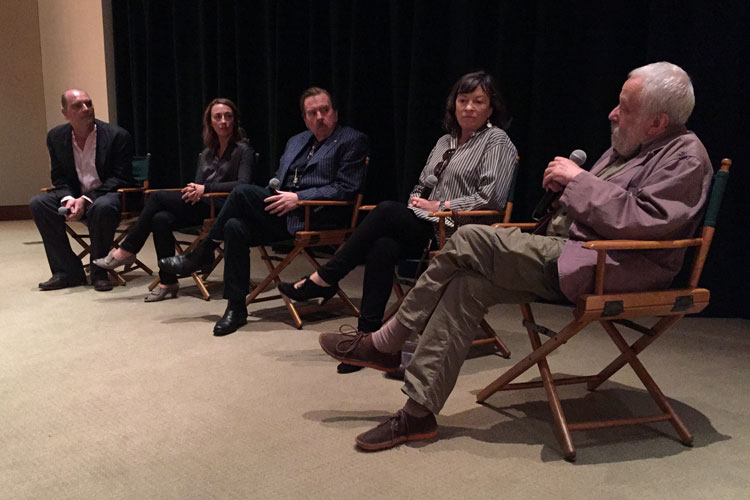The following questions and answers are excerpted from a conversation that followed the NBR screening of Mr. Turner.
Mr. Turner seems to use a wonderful shorthand of grunting in the film at times to communicate his point.
Leigh: I can see why people think that, but it’s not completely accurate. What we tried to do was get at what we understood from the descriptions of Turner. And he did grunt, but – and we also have this in the film – he was capable of great articulacy and a great number of classical references. I think it’s more complex than that, some people have written that he just communicates with grunts, and it isn’t true.
Spall: Interestingly enough it was an organic part that happened when we were growing the character. It wasn’t an external or objective decision that was made, it grew out of the character we were building, a mixture of this earthly almost beast-like character and this immense polymathic intellect and this amazingly curious mind that stored all this knowledge he was garnering. He had a very implosive character both intellectually and emotionally. This is a man who could say a million things and could talk for hours. But in life he never explained his work, so this grew out of somebody with a billion things to say, which manifested itself in a grunt . . . occasionally.
“Turner was always pushing the boundaries.”
Ms. Atkinson, Hannah is part of the family as Mr. Turner is growing up. Can you talk about developing her?
Atkinson: We really had very few facts about her life to go on. She was involved with the family for forty years and she stayed on at the house after he died. We knew that she had this skin condition. And we just talked about people I had known throughout my life to help me build the character. I found myself going back to my childhood and thinking about grownups that I knew. The ones that I examined were the strange people that you look at – they’re kind of the Eleanor Rigby type – and you think, how did she get to that point?
She was very much a part of the family. Not a normal setup. She worked for them, but she’s always been there and supportive. She was secretive inside, the perfect person to have around – no judgment. She saw Turner in his most relaxed state.
Ms. Bailey, can you talk about Ms. Booth’s life and character?
Bailey: Again, there wasn’t a great deal to go on, I tried to read as much as I could on what was known about her. Different people had different opinions. Ruskin was actually very nice about her, and said she was warm. Other people were appalled that Turner spent eighteen years with this woman who was illiterate, garrulous, and possibly – some people suspected – money grubbing. I wanted, along with Mike, to depict someone who was tough but warm and independent, and who could love him unconditionally without any loss of her own selfhood. That was my aim. Particularly since in this historical period women are often seen as the wife or the daughter or the girlfriend. But these women fascinate me in their own right, to think what they might have gone through as their own person. Of course my depiction of Ms. Booth was very literate, very sharp. She’s not stupid. Perhaps to some extent she replaced his father. She must have intuitively, instinctually had a great sense and feeling about his art, if not intellectually. She would have known nothing about the history of art, but for him to stay with her for eighteen years, she must have understood the levels of the man as an artist.
One of the most moving moments in the film was when he was listening in on Queen Victoria in the museum.
Spall: I think a lot of artists and people who create, even if they’re lovely or difficult people, filled with different traits, share one thing. They’re often trying to do things that are different or misunderstood. They follow their own path. Turner was always pushing the boundaries, because he’d done everything he had to. He had a good woman, he was safe, he had enough money, so he was able to go out and go with what was in his heart and gut, while not needing opinion to fall back on. He did want people to appreciate his work but never wanted to explain it or talk about it. He wanted to accept their praise but somehow feel evaded by it. I think that odd mixture of wanting to be loved and feeling that once you do get understood, you want to tell people to sod off was very much a part of him. He always wanted royal approval but every time he went anywhere near it he got a kick in the backside.

